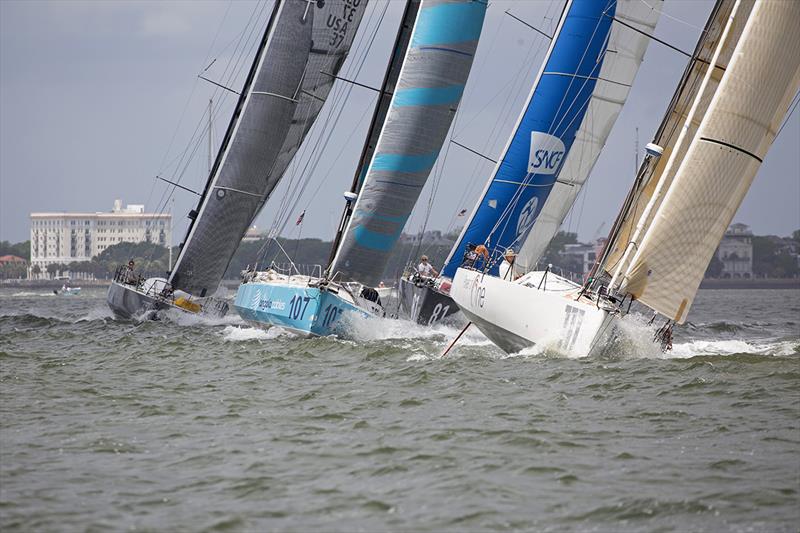
Atlantic Cup sailors endure heavy Leg Two conditions while Clipper sailors aim for New York
by David Schmidt 4 Jun 2018 11:00 PDT

2018 Atlantic Cup © Billy Black / Atlantic Cup
When it comes to singlehanded and shorthanded sailing, the French rule the world's oceans, as evidenced by the recent winners of the solo non-stop around-the-world Vendee Globe Race. Indeed, the French are also extremely well-represented in the Classe Mini, Class 40s, IMOCA 60s, and Jules Verne Trophy attempts, however there is room for other nationalities in this tightly fought game, provided, of course, that the sailors train and race hard.
One great example of American sailors getting involved in serious shorthanded sailing is the ongoing and biennial Atlantic Cup. The race, which is contested by teams sailing Class 40s, is comprised of two offshore legs: Charleston, South Carolina, to New York City, which began on May 26, and New York City to Portland, Maine, which began on Saturday, June 2, as well as an inshore series, which will unfurl on the waters off Portland on Saturday June 9 and Sunday, June 10.
The two offshore legs are doublehanded affairs, while the in-port racing uses six-person teams to whip the steeds around the buoys as quickly as possible.
Leg One, which stretched from historic and beautiful Charleston up to the Big Apple for a distance of 640 nautical miles, was a relatively light-to-moderate-air affair that saw Eärendil, skippered by Catherine Pourre (FRA) and Pietro Luciani (ITA), take top honors in the 11-strong fleet, followed by Amhas, which is being skippered by Micah Davis (USA) and Rob Windsor (USA), followed by Talanta, which is being skippered by Mikael Ryking (SWE) and Karl Jungstedt (SWE).
Leg Two, however, is proving to be a different animal and has been flashing its teeth at the teams as they negotiate its 360-nautical-mile run.
At the time of this writing, the fleet was roughly southeast of Nantucket, dealing with stiff upwind conditions, a nasty sea state, and plenty of breeze that - so far - has forced First Light, skippered by Sam Fitzgerald (USA) and Ashley Perrin (USA), to retire while also breaking gear aboard numerous other boats including Power of One (Donald Alexander and Paul Peggs), Toothface II (Mike Dreese and Tristian Mouligne), and Esprit Scout (Liz Shaw O'Toole and Kyle Hubley).
"Unfortunately due to significant [delamination] to our main sail and further damage to both our solent and staysail my co-skipper Ashley Perrin and I have made the decision to head for Newport, Rhode Island prior to evaluating our options to see whether continuing to Portland, Maine and the inshore series is an option," reported Fitzgerald. "We are all disappointed, however we are safe and approximately 45 miles out of Newport."
Also as of this writing, Davis and Windsor, sailing aboard Amhas, were in Leg Two's pole position, followed by Leonardo Chicourel (BRA) and Jose Guilherme Caldas (BRA), sailing aboard Angola Cables, with Mike Hennessey (USA) and Merf Owen (GBR), sailing aboard Dragon sitting in third place.
Still, with significant amounts of Gulf of Maine brine still left to cross before teams get a rest from their offshore work before spinning into inshore-racing mode, there's still plenty of opportunity for leaderboard comeuppances in the 2018 Atlantic Cup.
Meanwhile, sailors participating in the fully-crewed Clipper Round The World Yacht Race have now exited the Panama Canal and are back in the "home waters" of the North Atlantic, with their bows aimed at New York City.
At the time of this writing, Unicef was leading the hunt, followed (some 0.07 nautical miles astern) by Sanya Serenity Coast and Dare To Lead, but with more than 1,800 nautical miles separating current position reports from the New York City skyline, it's fair to say that the door is wide open for leaderboard changes as the fleet crosses the Caribbean Sea before digging their keels into the fast-flowing Gulf Stream waters.
May the four winds blow you safely home,
David Schmidt, Sail-World.com North American Editor